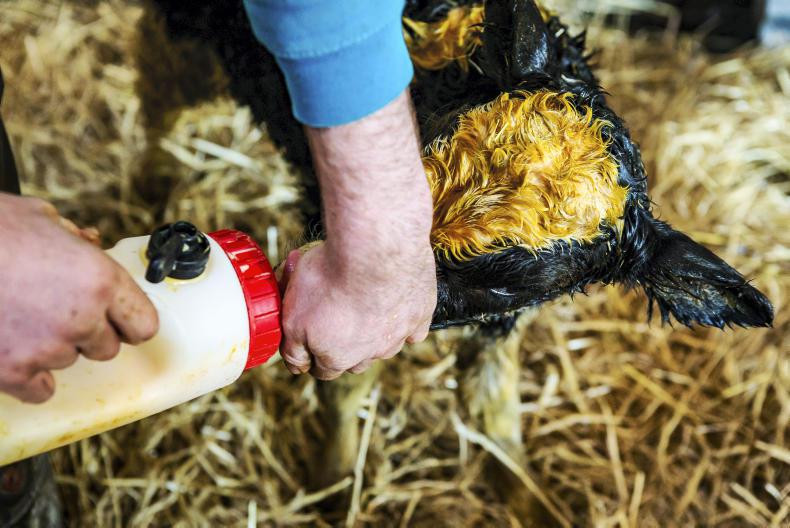Farmers in NI who continue to retain cattle persistently infected (PI) with bovine viral diarrhoea (BVD) could receive an unannounced inspection from a DAERA official to check that these animals are being isolated in accordance with legislative requirements.
The BVD Eradication Scheme Order (NI) 2016 requires herd keepers to ensure that PI animals are “isolated within housing to prevent direct or indirect contact with other susceptible animals”.
According to a DAERA statement, unannounced inspections are “due to commence in the coming weeks”, and if PI animals are found not to be isolated, then the herdkeeper may be prosecuted.
If convicted, the legislation allows for fines of up to £5,000 for a single animal or up to £1,000 per animal if more than five animals are involved.
Current rules
At present, a herd keeper in NI must take a tissue sample from a calf (by tagging) within 20 days of birth.
If the test comes back positive for BVD, the owner will receive a letter from Animal Health and Welfare NI (AHWNI) setting out options, including that of doing a retest (by taking a blood sample) within three to four weeks of the initial test.
If the animal is not retested or comes back with a second positive result, the advice from AHWNI is to cull the calf as quickly as possible.
Just how many days constitutes “a significant period” for a PI to be retained is not specified
However, if the animal is “still in the herd for a significant period after the positive test”, a DAERA spokesperson confirmed that herd keepers will now receive an “isolation warning letter” from the Department.
That will be followed up by an inspection, if the calf continues to remain in the herd.
Just how many days constitutes “a significant period” for a PI to be retained is not specified and it is also not covered in the relevant BVD legislation.
But, as a general rule, AHWNI quotes PI retention figures on the basis of PI animals still being alive five weeks after a positive test.
Results
Recent data released by AHWNI shows that on 1 December 2020 the number of herds retaining PI cattle for more than five weeks had dropped below 100 herds for the first time since tissue tagging became compulsory on 1 March 2016.
PI animals are unable to move off farm except for rendering and, since 1 May 2018, cannot go for direct slaughter at NI meat plants, so there is no financial incentive to retain a diseased animal.
In addition, herds in NI that retain PI animals are excluded from membership of the NI beef and lamb Farm Quality Assurance Scheme.
Read more
Fewer than 100 herds retaining PI calves in NI
No imminent change to BVD rules
Farmers in NI who continue to retain cattle persistently infected (PI) with bovine viral diarrhoea (BVD) could receive an unannounced inspection from a DAERA official to check that these animals are being isolated in accordance with legislative requirements.
The BVD Eradication Scheme Order (NI) 2016 requires herd keepers to ensure that PI animals are “isolated within housing to prevent direct or indirect contact with other susceptible animals”.
According to a DAERA statement, unannounced inspections are “due to commence in the coming weeks”, and if PI animals are found not to be isolated, then the herdkeeper may be prosecuted.
If convicted, the legislation allows for fines of up to £5,000 for a single animal or up to £1,000 per animal if more than five animals are involved.
Current rules
At present, a herd keeper in NI must take a tissue sample from a calf (by tagging) within 20 days of birth.
If the test comes back positive for BVD, the owner will receive a letter from Animal Health and Welfare NI (AHWNI) setting out options, including that of doing a retest (by taking a blood sample) within three to four weeks of the initial test.
If the animal is not retested or comes back with a second positive result, the advice from AHWNI is to cull the calf as quickly as possible.
Just how many days constitutes “a significant period” for a PI to be retained is not specified
However, if the animal is “still in the herd for a significant period after the positive test”, a DAERA spokesperson confirmed that herd keepers will now receive an “isolation warning letter” from the Department.
That will be followed up by an inspection, if the calf continues to remain in the herd.
Just how many days constitutes “a significant period” for a PI to be retained is not specified and it is also not covered in the relevant BVD legislation.
But, as a general rule, AHWNI quotes PI retention figures on the basis of PI animals still being alive five weeks after a positive test.
Results
Recent data released by AHWNI shows that on 1 December 2020 the number of herds retaining PI cattle for more than five weeks had dropped below 100 herds for the first time since tissue tagging became compulsory on 1 March 2016.
PI animals are unable to move off farm except for rendering and, since 1 May 2018, cannot go for direct slaughter at NI meat plants, so there is no financial incentive to retain a diseased animal.
In addition, herds in NI that retain PI animals are excluded from membership of the NI beef and lamb Farm Quality Assurance Scheme.
Read more
Fewer than 100 herds retaining PI calves in NI
No imminent change to BVD rules






 This is a subscriber-only article
This is a subscriber-only article











SHARING OPTIONS: